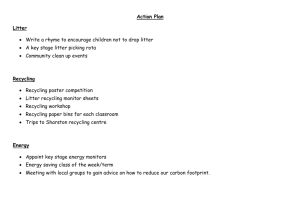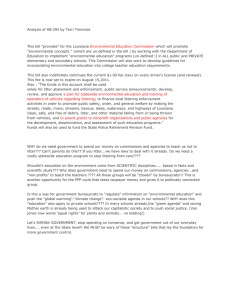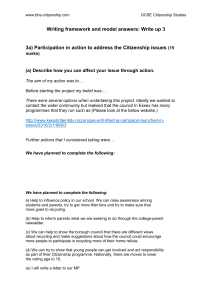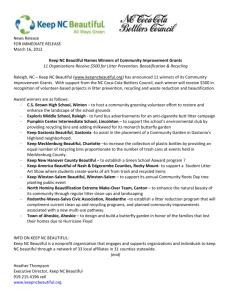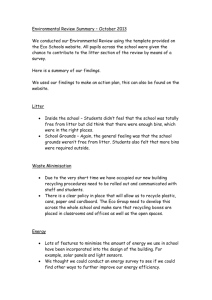RDP2Littering
advertisement
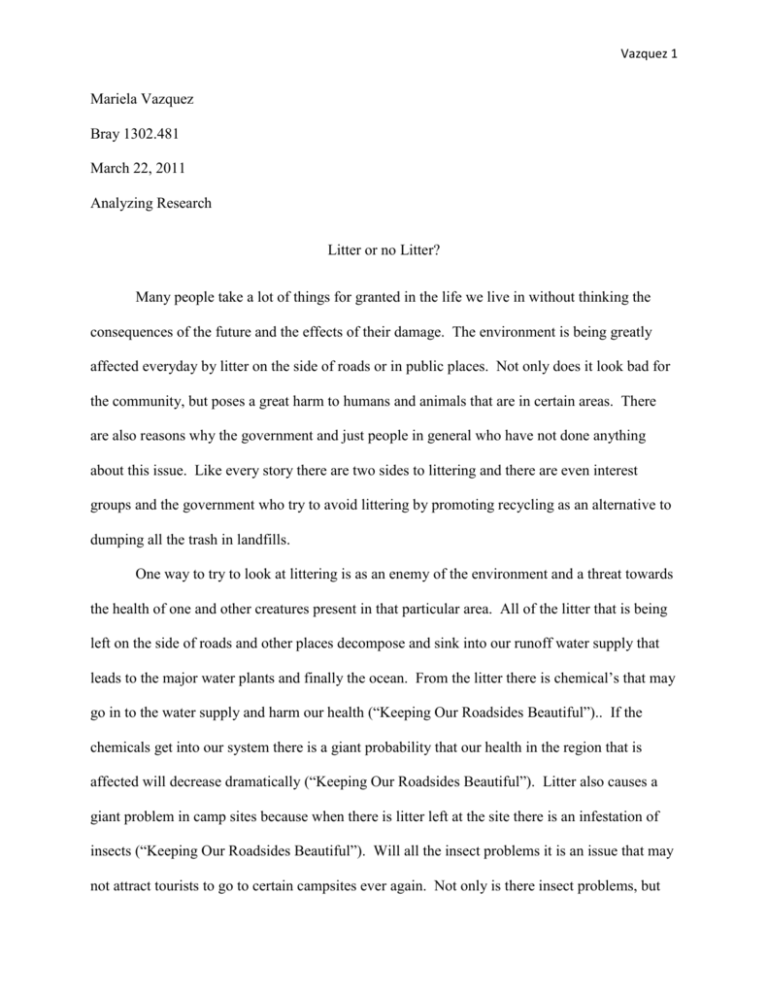
Vazquez 1 Mariela Vazquez Bray 1302.481 March 22, 2011 Analyzing Research Litter or no Litter? Many people take a lot of things for granted in the life we live in without thinking the consequences of the future and the effects of their damage. The environment is being greatly affected everyday by litter on the side of roads or in public places. Not only does it look bad for the community, but poses a great harm to humans and animals that are in certain areas. There are also reasons why the government and just people in general who have not done anything about this issue. Like every story there are two sides to littering and there are even interest groups and the government who try to avoid littering by promoting recycling as an alternative to dumping all the trash in landfills. One way to try to look at littering is as an enemy of the environment and a threat towards the health of one and other creatures present in that particular area. All of the litter that is being left on the side of roads and other places decompose and sink into our runoff water supply that leads to the major water plants and finally the ocean. From the litter there is chemical’s that may go in to the water supply and harm our health (“Keeping Our Roadsides Beautiful”).. If the chemicals get into our system there is a giant probability that our health in the region that is affected will decrease dramatically (“Keeping Our Roadsides Beautiful”). Litter also causes a giant problem in camp sites because when there is litter left at the site there is an infestation of insects (“Keeping Our Roadsides Beautiful”). Will all the insect problems it is an issue that may not attract tourists to go to certain campsites ever again. Not only is there insect problems, but Vazquez 2 the animals that go and eat the litter may linger around that area in hopes that there will be more food (“Keeping Our Roadsides Beautiful”). . There have been problems with this because animals are not eating according to their natural diets because they are addicted to human food (“Keeping Our Roadsides Beautiful”). Other than all of the hidden matter that no one sees or even pays attention to the main situation at hand is the fact that there is all this trash and it is making our Earth look like nasty and distasteful to where people live. It makes the communities look terrible and no one really wants to live in s messy community (“Keeping Our Roadsides Beautiful”). By stating this there are people who believe that there is hope in cleaning the communities and in keeping them clean. Smaller cities are trying to make their homes nicer and better by cleaning the litter off the side of the roads and in other areas where litter is present. Some have gone to the extent to rewarding those who are willing to recycle in the region hoping that word passes to other small towns (Gooch). The recycling centers in the small towns really appreciate what the citizens are doing for them (Gooch). Not only are they trying to keep the issue under control, but there are also educating the younger students in schools (Morton). They present programs that try to help the children so that they learn this while they are still young and that way they are able to understand why it is wrong and just what they can do to help (Morton). They entertain the kids with costumes and some go by the litter superheroes in some of the schools where they’re present (Morton). Some even hope that the message the little ones are sent with will spread to their relatives and even other children in other schools (Morton). However, there are no true fairy tales in the real world and there are people who think recycling is just a waste of time and find no use to it. Some people think that the damage is too grand that is done to this poor planet that Vazquez 3 recovering from it is just not possible. Others agree that people are the ones to blame and because they refuse to change their habits there is no bouncing back for the better of the future. In some countries there are passing of laws that are just not working quite out to the expectations of the people’s needs. They state that there is no way for the government to be able to pay for the extra work the officials need (Martin). Some departments even argue that there are more punishable crimes that police officers and other officials need to take care of than that of a simple crime such as littering (Martin). Their main point is that there is just not enough man power to be able to enforce such a law and there are graver crimes that need attention. There is also stated that the cost of recycling is enormous compared to the amount of objects needed to be recycled (Chilton). In Chilton’s article he states the cost of recycling is just not enough to cover for the money needed for the building of recycling facilities. There is the method of trying to fine people who drive around with uncovered loads is their trucks (Chase). The only problem with them trying to fine citizens is they can only do it to uncovered loads so if the load is covered, but something falls out by accident and there is no one to report it the trash that fell is left there (Chase). The government is still trying to fix these problems and with the help of interest groups such as Aunt Litter Inc. there is a bit of hope to making it all tie together and work to our benefit. The government not only has tried to pass laws in some counties and cities, but has done it successfully with the “Don’t Mess with Texas” as the slogan (Morton). There is said that the government is going to try to pass a law that makes it illegal to dispose of take-out beverage containers improper disposal illegal (Biggs). Not only are they trying to get the passing of bills, but also it is starting new programs in the GAO. If the programs are successful the Government Accountability Office will be able to manage all of these new programs to start recycling Vazquez 4 facilities so that there will not be as much litter (Stephenson). Will the help of Interest Groups such as Aunt Litter Inc. donating money ($10,000 in 2008) there is a little bit of hope for the nation to give back a little of what it has already taken (“Auntie Litter Inc.). With groups as passionate about the littering issue there is just the need of money that other people who care just as much to keep their homes beautiful help provide just a bit of it. It makes one wonder what a single person can do to help the cause of just what is going on and how they can affect the outcome of the environment’s condition. There is the side fighting to keep Earth beautiful and to stop turning it into a wasteland and then there is the side who believe it is a lost cause. The government and interest groups can only do so much to help with what is going on and to keep it under control. We as individuals need to make the decision with the next piece of trash we have in our hands or we encounter in our daily lives… Let it “go with the wind” or make the extra effort and walk to the trash can or blue bin? Vazquez 5 Bibliography Biggs, John A. "Should Congress Enact Proposed Legislation To Require Mandatory Deposits On Beverage Containers? CON." Congressional Digest (0010-5899) 57.3 (1978): 91. Points of View Reference Center. EBSCO. Web. 23 Feb. 2011. Chase, Candace. "Unsecured trash loads mean warning, fines." Daily Inter Lake (Kalispell, MT) 24 Jan. 2011: Points of View Reference Center. EBSCO. Web. 28 Feb. 2011. Chilton, Kenneth, and James Lis. "Recycling for recycling's sake: A waste of time and money." USA Today Magazine 121.2576 (1993): 58. Points of View Reference Center. EBSCO. Web. 28 Feb. 2011 Gooch, Kelly. "Small cities fighting waste with recycling." Tyler Morning Telegraph (TX) 13 May 2010: Points of View Reference Center. EBSCO. Web. 28 Feb. 2011. "Keeping our roadsides beautiful." Current Health 1 (0199-820X)20.7 (1997): 20. Points of View Reference Center. EBSCO. Web. 23 Feb. 2011. Martin, Sammy. "Enforcing anti-littering ordinance difficult." Manila Times, The (Philippines) 18 Sept. 2010: Points of View Reference Center. EBSCO. Web. 23 Feb. 2011. Morton, Neal. "Litter superheroes talk trash to students." Monitor, The (McAllen, TX) 02 Dec. 2010: Points of View Reference Center. EBSCO. Web. 28 Feb. 2011. Stephenson, John B. "Recycling: Additional Efforts Could Increase Municipal Recycling: GAO07-37." GAO Reports (2007): 1. Points of View Reference Center. EBSCO. Web. 28 Feb. 2011.

